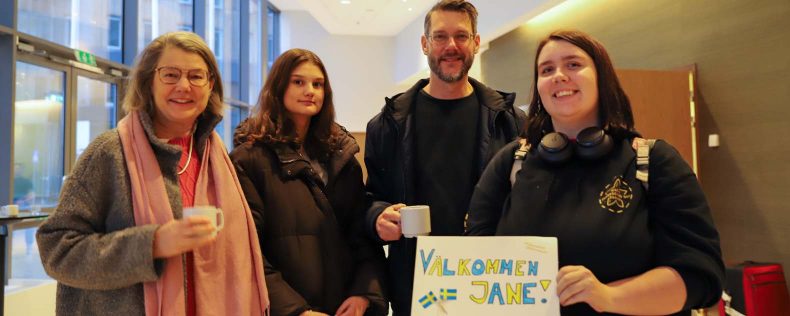Q / Why do DIS hosts choose to have DIS students live with them?
There are many different reasons, but most likely, because they:
- Value the intercultural exchange
- Are interested in your culture and traditions
- Want to improve their and/or their children’s English
- Want to add something new to their everyday life
Q / How can DIS match me with a compatible host?
A / The DIS Host Team will match you based on the personal letters we receive from you as well as from your registration form, so please be as honest and clear in your descriptions and requests as possible. Include any personal items about yourself that you feel we should know. Everything from lifestyle choices, to if you are an early bird or like to play loud music in your room can be good for us to know to better match you. We receive the same kind of information and wishes from our hosts and match you accordingly.
Also, if you have preferences of what kind of household you will live with, you will have the opportunity to include wishes during registration. However, note that making placements is a complex puzzle, and our hosts are as different as the students who join them in terms of lifestyle, interests, routines, age, and composition. Therefore, please understand that we are not able to accommodate all requests.
Q / Will living in a Homestay limit my freedom?
A / Your local hosts will be down-to-earth and will treat you as an adult son/daughter in their home. You are free to go out with your friends during the week or to travel over weekends. However, you should strive for a balance. If you plan to travel every weekend or go out every night, living in a Homestay may not be the right choice for you. You should be prepared to spend some evenings and weekends with your hosts as they are genuinely interested in devoting time to you and introducing you to their traditions – they want to incorporate you as much as you want to be incorporated!
Q / How are hosts approved by DIS?
A / DIS vets all Homestay hosts before accepting them into the program. We do this by having a team of trained “visiting consultants” who pay all interested hosts a visit to their home. These visiting consultants are all experienced hosts themselves and are trained in this vetting process. The full time staff of the DIS Host Team also visit host families.
At the meeting in the host’s home, the visiting consultant sees the apartment/house and especially the room the student will be living in to make sure it contains everything DIS requires. They also have a conversation with the host, during which they go through the host’s expectations to ensure they align with DIS’ standards.
After the visit, the visiting consultant writes a profile with important information about the host’s interests, hobbies, and wishes for the semester. This profile also contains information about the hosts themselves, their motivation for hosting, the physical surroundings, and other relevant information. The Host Team uses this profile (together with all the information the Homestay host has put into their profile themselves) to match them individually with a student.
Q / How do finances work when living in a Homestay?
A / All hosts receive a basic subsidy from DIS to cover your living expenses while you are in their household such as groceries for two meals a day, utilities, and laundry expenses. If you prefer to snack between meals, you will buy some of your own snacks, and if you join your hosts for an excursion with an entrance fee or are out for a meal together, you should offer to pay your share of the bill. If your hosts insist on paying, accept with gratitude as this is not covered in the DIS subsidy and is a gift from them to you!
Q / How does the food situation work?
A / All meals are provided. However, you are expected to make your own lunch and to prepare your own breakfast. Most Swedish households eat dinner together and consider this a prime time for discussions, laughs, and bonding. Dinnertime is a great time for you to spend with your hosts!
Q / I have dietary restrictions. Can I still sign up for a Homestay?
A/ Many hosts prefer to live with students who do not need any special accommodations when it comes to diet. So please be aware that dietary limitations limit the number of hosts you are compatible with. If at all possible, it might be in your best interest to be flexible in your diet during your time abroad.
If you have dietary limitations that are not flexible (e.g. religious restrictions, health needs, and/or food allergies), convey this to DIS when registering so we can consider what practical implications it would have for your potential Homestay.
If living with a Homestay is your top preference, the Host Team is happy to hear from you once you have registered so we can get started on finding a compatible match for you.
Q / Do the Swedes speak English well?
A / The Swedes generally speak English very well, though fluency varies. At least one person in your DIS Homestay will speak English, but you will most likely be able to communicate with everyone in English, with the exception of small children. Games and mimics are great supplements to words! And no matter how good your hosts are at speaking English, there are always language misunderstandings. Treat them with a sense of humor and take time to talk through situations in which misunderstandings occur.
Q / If I choose a Homestay, will I feel isolated?
A / Even before Arrival, you will have a chance to connect with other DIS Homestay students who live in neighborhoods close to your Homestay, through the DIS Navigate app. Students in the same network have explored their neighborhoods, commuted to and from DIS together, and built friendships with each other and each other’s hosts. Additionally, DIS holds various social events and activities throughout the first weeks of the semester, such as New in Town meetups, so that students across DIS Stockholm can get to know each other.
Q / Can I live with another DIS student in a Homestay?
A / Some Homestay students share their Homestay with another DIS student. If this is something you are interested in, be sure to include this info when you register. The DIS Host Team will try to accommodate you.
Q / What if we don’t hit it off?
A / Living with strangers can be hard at times, especially when there is a language barrier. If you feel that you are entering into a conflict with your host that you are unable to solve yourself, we encourage you to contact the Host Team. All team members have experience with conflict resolution and are here to assist you.
In rare cases, a conflict in a Homestay can escalate to the point where either the student or the host feels that there is no other option than a move. The Host Team is here to assist both parties through the conflict and we will give you tools to work with.
If we come to the conclusion that there is no other option than a housing move, you are required to let your host know that you are moving. So, bottom line, you will need to communicate your frustrations and difficulties in a civilized and proactive manner to your hosts at some stage. It makes a lot of sense to do this early on in the process – and not wait until it bottles up and you see moving away from the conflict as the only solution!


